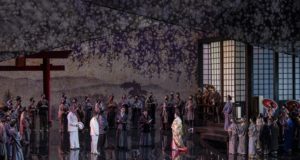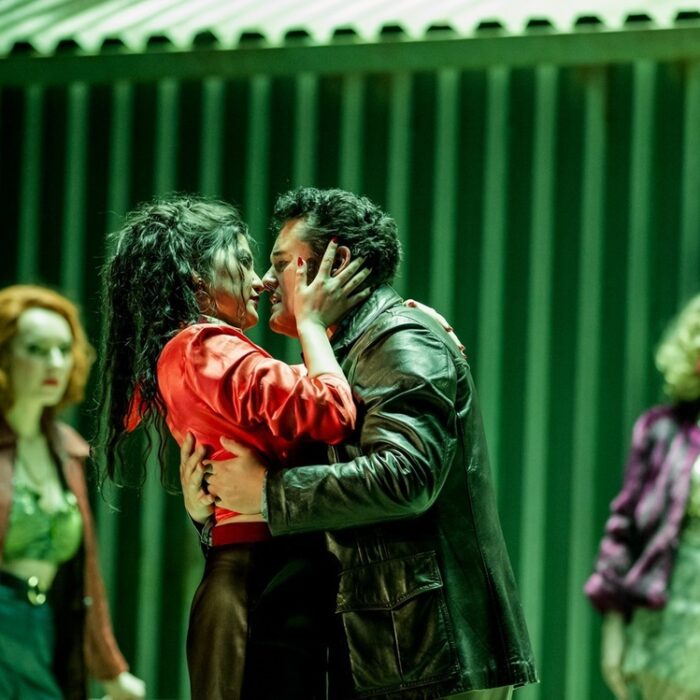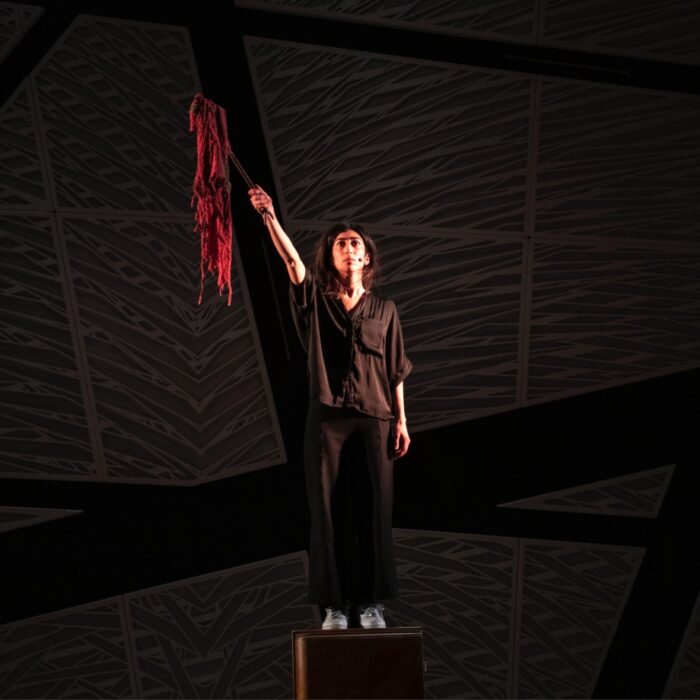
Palau de les Arts 2021-22 Review: Madama Butterfly
Maria Teresa Leva Shines in Nonsensical Reading of Famed Puccini Work
By Mauricio Villa(Credit: Miguel Lorenzo)
This review is from the performance on the 16th of December 2021
Despite several singers falling ill, the Palau de Les Arts still managed to find a way to present a revival of its production of “Madama Butterfly”.
Jorge Rodriguez-Norton, who played Goro, fell ill and had to be replaced by Mikeldi Atxalandabaso at very short notice. Tenor Piero Pretti was not feeling 100 percent either and did not sing the pre-general rehearsal. And then Marina Rebeka–who was making her role debut as Cio-cio-san role in this production–also fell ill and had to be replaced by Maria Teresa Leva. Leva had been hired to sing a single performance but due to this last-minute call would sing two performances in the following days.
A Promising Butterfly
As soon as the bright and lyrical voice of Maria Teresa Leva was heard offstage, with long floating lines, a secure crescendo on her first B flat in “Ove s’accoglie” and an unbelievable, soaring, pianissimo high D flat, it was clear that this young soprano had great potential and was going to make this evening memorable. She has a sweet, dark, round timbre, and despite the crystalline, floating pianissimi, powerful rotund high notes too, as she proved on the high B flat of “Amore mio” in Act one. She played a naive, shy young woman during Act one, making beautiful vocal inflections and coloring her voice. The duet “Viene la sera…vogliatemi bene” featured an outburst of passion, lyricism, and emotion, crowned at the end with a long high C.
Even with such a surprisingly promising first act, it is in the second act where sopranos who have interpreted the unfortunate geisha are truly put to the test. Act two is notorious for its length and the emotional arc and acting which the performers must accomplish. Leva maintained the high hopes she had set earlier and her singing remained consistently impressive. Dramatic moments like “Che tua madre” were infused with a sense of hope and faith, avoiding overwrought verismo mannerisms or gestures. The interpretation of her aria “Un veld dí vedremo” was full of joy and emotion as she sang in an exquisite mezza voce before delivering a strong, climactic high B flat. She delivered two more breath-taking pianissimi: a high A natural on “quando fa la nidiata,” and an offstage B natural on “ed io col mio dolor.”
In “forse potrei cader morta sull’attimo,” Leva radically changes, becoming a resigned woman who will hopelessly follow her husband’s desires, even if it means her death. You could hear in Leva’s singing this sense of abandonment, where she kept the written vocal line in the most dramatic moments, instead of the sobbing, fake crying and parlatto singing usually witnessed during the last scene of the opera. The interpretation of “tu…tu…tu piccolo Iddio” was emotional and moving, and her A naturals were strong. What is more, her voice was fresh at the end of the performance, which is a hard task in a role like Butterfly. From Butterfly’s first entrance to the conclusion of the opera the soprano must sing nonstop for about an hour and 15 minutes. During this time she is asked to sound young, innocent, sing long legato lines and have a strong centre to sing the dramatic and tragic moments as well.
Even with the pressure of stepping onto the stage at very short notice and knowing that she has to sing two performances of Butterfly in subsequent days, Leva gave herself completely to the role both vocally and dramatically and obtained an all-round success which was greatly rewarded by the audience at the performance’s conclusion.
Mixed Support
Unfortunately, Suzuki, performed by the Spanish mezzo-soprano Cristina Faus, was not a great complement to Leva’s Butterfly. Faus’ voice sounded dry, distant, and tired and her lower register was not strong. She had trouble maintaining the long lyric lines of the “flower duet,” where she seemed out of fiato and even shortened her lines when they should be sung in unison with Butterfly. With so many other members of the cast sick I couldn’t help but wonder if she was also in a similar state.
Italian tenor Piero Pretti played the role of the ungrateful American marine, Pinkerton. Despite having suffered a cold and not being completely recovered, his voice showed no signs of tiredness nor dryness and he delivered a passionate performance with his ringing high B flats and a long sustained high C alongside the soprano at the end of Act one. His timbre is a bit guttural, and his volume is modest, but he is a reliable tenor, and, conscious of the nature of his instrument and the acoustics of the theatre, he sang most of his high notes at the very front of the stage.
Spanish baritone Angel Ódena played Sharpless, the American consul, with a voluminous, dark and potent voice. During his entrance line, “sbuffa, inciampica,” he emitted a perfect high G and maintained the uncomfortable tessitura of the role, which constantly resides around a high F, never an easy zone for a baritone to be singing all night. As with most Puccini baritone roles–with the exception of Gianni Schicci–there are no solo arias and the baritone is relegated to supporting lines for the soprano or tenor. Ódena sang with measure and portrayed a noble character moved and worried by the fragility of Butterfly against the indifference and fickleness of Pinkerton.
Mikeldi Atxalandabaso, who joined the company two days before the general rehearsal to cover a sick colleague, showed once again his professionalism, artistry, and beautifully projected sound. As per usual he transformed a minor secondary role–that of Goro–into a bright and important character. It is always a luxury to have Atxalandabaso in the cast of any production.
Incoherence & Misreading
Emilio López directed the production, which was revived for the second time at Palau de les Arts but has been seen on several Spanish opera stages. With a beautifully constructed first act, with hyper realistic sets by Manuel Zuriaga, the performance promised to be a modern approach to this classic Puccini title. But everything radically changes in Act two, breaking the coherence and unity shown in Act one. The problem stems from the current obsession with giving a second reading to operas and writing a parallel dramaturgy. Act two transpires after the devastating American atomic bombing of the cities of Hiroshima and Nagasaki.
The Act two set, as with Act one, is hyper-realistic and shows the devastation and destruction caused by the bomb, and it is here that the plot and story fall apart. It is hard to believed that Butterfly, her son, Suzuki and the consul would freely walk through an area that is highly irradiated with toxic nuclear fallout. The “flower duet,” where Suzuki and Butterfly collect all the flowers from the garden and spread them across the tatami floor makes no sense and seems even comical when there are no trees or plants at all. What is the point of setting the action in such a specific, marked period? Does it provide something new to the plot? Does it affect the characters in any way? The answer to both questions is no. All the gratuitous references to the atomic bombs are therefore irrelevant and useless.
The dance which happens during the Act Two interlude, where female dancers wear long vaporous sleeves that simulate the wings of a butterfly would have been adequate if the language of the staging were abstract and symbolic: but not with such a hyper-realistic approach to acting and staging. The acting of the singers was plain and linear, with the exception of Leva in the titular role, which proved to be a poor directing choice from the stage director. It was a good attempt to avoid gratuitous dramatism, but it lacked emotion.
Antonino Fogliani led the Orquestra de la Comunitat Valenciana. He clearly exposed the orientalism of Puccini’s score and carefully shred all the timbrical effects of it, choosing above all else pesante and lenti tempi. In my opinion, Fogliani’s greatest achievement was his consideration for the voices of the singers, measuring and leveling the orchestral sound with the voices. That is a hard job in a venue like the Palau de Les Arts, where the orchestra pit is big and completely exposed. The acoustics of the theatre are so good that the orchestral sound is always clear and powerful, to the detriment of the singers who are usually unable to surpass such a dense curtain of sound. Fogliani gave impetus and maintained the explosive climax of Puccini’s score, but at the same time respected the voices of the singers so that their sound was not hidden by the forte orchestra sound. The Cor de la Generalitat Valenciana did excellent work and delivered an exquisite performance of the “bocca chiusa” choir at the end of Act two.
Despite the initial disappointment of the cancelation of Latvian soprano Marina Rebeka, we were once-again reminded of the magic of the live theatre thanks to the discovery of a promising young soprano in Maria Teresa Leva. She gave an impeccable and moving performance accompanied by the rich voice of tenor Piero Pretti and the mastery of Mikeldi Atxalandabaso, in a production that was hurt by pretentious staging that set itself up to appear politically minded but ultimately turned into something irrelevant.


